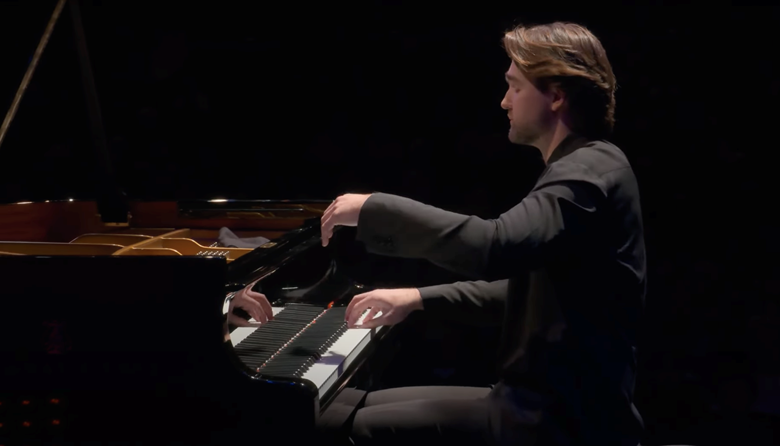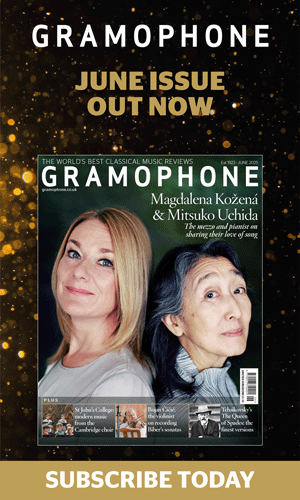Jed Distler's Cliburn Blog No 12: The Semi-finals conclude and the finalists are chosen
Jed Distler
Monday, June 2, 2025
'Philipp Lynov proved to be an undisputed master of Ravel’s domain, where technical hurdles simply didn’t exist'

Miroirs may not be Ravel’s most intrinsically difficult suite of piano pieces, yet it contains some of this composer’s most exposed piano writing. As with Mozart, Miroirs leaves no room for bluffing or covering up, or what my beloved piano professor Stanley Lock called ‘dusting the keys’.
Opening his Semi-final recital with Miroirs, Philipp Lynov proved to be an undisputed master of Ravel’s domain, where technical hurdles simply didn’t exist. All of ‘Noctuelles’s fluttering and flickering phrases flew by in the most feathery fashion. The animated pace and seamless arpeggios of ‘Une barque sur l’océan’ transformed the piano’s hammers into colourfully cresting waves, with not one texture out of balance for even a split second. I can’t remember which Hollywood film studio advertised their movie musicals as ‘All Talking, All Singing, All Dancing’, but these words describe Lynov’s ‘Alborada del gracioso’ to a proverbial tee. It constantly oozed rhythmic kick and sultry allure, replete with the most swinging glissandi this side of Oscar Peterson, frighteningly accurate leaps, and repeated notes that even Dinu Lipatti would have envied. Perhaps ‘La vallée des cloches’s microscopic gradations of soft dynamics came off louder than ideal, but I’m nitpicking. I won’t cite chapter and verse over Lynov’s equally commanding Prokofiev Sonata No 8, a work that seems to be finding increased favour in competitions. Yet his shaping of large paragraphs, breathtaking legato touch, subtle pedalling and linear cognition added up to a warmly perceptive and internalised reading that complemented the darker abstraction of Chaeyoung Park’s equally authoritative yet quite different Preliminary Round performance.
Philipp Lynov:
I’ve learned never to expect anything routine from Chaeyoung Park, and her recital opener, Myra Hess’s famous arrangement of Bach’s ‘Jesu, joy of man’s desiring’, was no exception, as she probed and voiced the counterpoint as if playing three-dimensional chess. Her Scriabin Ninth Sonata differed from the usual vapour and mist in a line-orientated interpretation characterised by prominent basses and clear distinctions between melodic and decorative components. Such details, of course, are borne out in the score, and one could take dictation from Park’s fusion of idiomatic fervour and textural scrutiny.
Several blog entries ago I mentioned Park’s brilliant rendition of Beethoven’s Hammerklavier Sonata from the 2023 Arthur Rubinstein Competition, in hopes that Cliburn followers would get a chance to hear her Op 106 during the Semi-finals. My wish came true. Earlier Cliburn competitors have ventured into this Sonata’s formidable territory with varying degrees of success, including Aristo Sham in this year’s Quarter-finals. None that I’ve heard, however, hold a candle to Chaeyoung Park’s awesome achievement on Sunday. Her conception of the first movement has become more precipitous and daring since 2023. More than before, she follows each line from its starting point through to its final destination with great flexibility and headlong momentum. Such exhilaratingly intelligent music making made me forgive Park’s playing of the ‘correct’ A natural rather than the controversial ‘inspired misprint’ A sharp, in bars 224-226. As you’ve gathered, I’m obsessed by this tiny, polarising detail!
One may not agree with Park’s stretched-out ritardandos in the Scherzo, but her angularity and élan inevitably won me over. She plays the Adagio sostentuto in a faster, less overtly inward manner than she did in the Rubinstein, but there’s more linear awareness and inner tension, and I found myself hanging on to her every note. Following a stark and dramatically paced introduction, the Fugue took off like a hurricane, with no detail skimmed over or left unaccounted. Ironically, it takes super-pianism on Park’s level to fully convey the composer’s defiant struggle and ultimate triumph.
Chaeyoung Park:
I found Piotr Alexewicz’s evening recital frustrating, notwithstanding his powerful projection and prodigious palette of colours. His lurching phrasings and frequent rhetorical pit-stops in the first two movements of Schumann’s C major Fantasie undermined the music’s sweep and left a sectionalised impression. The lyrical Finale cohered, but lacked serenity and often got too loud too soon. In Chopin’s B flat minor Sonata, the Scherzo suffered from Alexewicz’s twitchy fussing with the pulse in the repeated chords and his mooning over the Trio. He made beautiful sounds in the Funeral March’s Trio, but the entire movement dragged. One must credit Alexewicz, however, for his creative inflections in the Finale’s rapid unison lines. Following the Schumann and Chopin with Gershwin’s Three Preludes looks bizarre on paper, yet they served as a kind of unexpected encore. I half-expected Alexewicz to play the middle Prelude as if it were a Chopin Nocturne, à la Shura Cherkassky or Arthur Rubinstein, but his tempo came within reasonable walking distance of Gershwin’s own straightforward and unsentimental recording from the 1920s. And the first and third Preludes had infectious fire and dash.
Piotr Alexewicz:
Over the course of this competition, I’ve expressed respect and admiration for Yangrui Cai’s workmanship, while often finding his music making cold and distant. With that in mind he brought much more variety of characterisation to each of Prokofiev’s Romeo and Juliet selections than I’d heard in pieces from earlier rounds. His lucid and thoughtfully structured performance of Thomas Adès’a Darknesse Visible featured gorgeously controlled rapid repeating notes and appropriately outsized dynamic contrasts. In Ravel’s Gaspard de la nuit, I liked how Cai kept a relatively strict basic pulse throughout ‘Ondine’, making expressive points through dynamic shadings rather than tempo modification, not unlike Arturo Benedetti Michelangeli’s conception. The pianist’s ‘Le gibet’ was on the cool and literal side, but his steady animation stands apart from the slow-motion languor in which too many young pianists indulge. Despite a ‘Scarbo’ that often overshot the speed limit, Cai’s fingers never lost control, and even managed to get in some rarely emphasised left-hand detailing. For surface sheen and transparency alone, this may have been the best-executed ‘Scarbo’ of the 2025 Cliburn.
Yangrui Cai:
At around 10:50pm the jury chairman Paul Lewis announced the six finalists in random order: Angel Stanislav Wang, Carter Johnson, Vitali Starikov, Evren Ozel, Aristo Sham and Philipp Lynov. Good calls, all told, although I would have chosen the immensely gifted Chaeyoung Park or Jonas Aumiller over Angel Stanislav Wang in a heartbeat.
Gramophone is a Media Partner of The Cliburn International Piano Competition
















